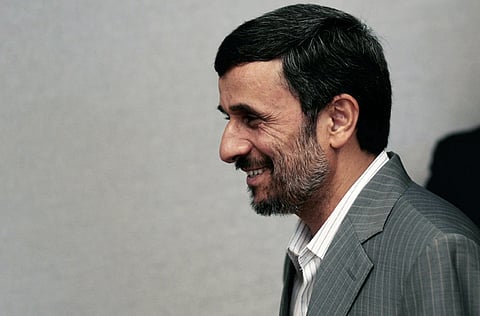Iran's new year plan has few takers
Iranian president used Nowruz celebrations to make foes and friends alike

After weeks of dithering, Iran is finally taking steps to assert its influence in neighbouring Bahrain, a land it once laid claim to. After Saudi Arabia and some other Gulf Arab countries sent troops to shore up the regime in the troubled archipelago, President Mahmoud Ahmadinejad's government went on a diplomatic and perhaps covert offensive to support the other side of the conflict.
On Thursday, the Iranian president warned Saudi leaders to "learn a lesson from the fate of Saddam Hussain" and stop interfering in the Gulf state.
This is a position that Ahmadinejad had gone to great lengths to avoid, as he was trying to win some friends in the Middle East at a time when his country is under enormous outside pressure over its controversial nuclear programme.
Plagued by internal opposition and broad UN sanctions, Tehran had just recently been on a regional charm offensive, wooing Arab statesmen it once vilified as too pro-American.
Among the unlikely invitees was King Abdullah of Jordan, a longtime critic of Tehran, who was due to attend the Nowruz (Persian New Year) celebrations in Iran this week. But Ahmadinejad was forced to call off the visit at the last minute in the face of enormous opposition from the conservative-dominated parliament.
Once a big party spoiler himself, taking extreme positions to undermine efforts at normalisation by more moderate Iranian governments, Ahmadinejad has now fallen prey to the same games he once played. He has come under a flurry of attack from Iranian hardliners of a different hue and affiliations, including some of his staunchest allies in the regime.
"Given the current situation when Arab people have revolted against their leaders, we should not invite such rulers," said Heshmatollah Falahatpisheh, a senior member of parliament.
While ruthlessly clamping down on dissent at home, Iran has supported the wave of mass uprisings in the Arab world; and in the case of Bahrain, some extremists have called for direct intervention.
The conservative daily, Raja News, said on Thursday that many Iranians had signed up for "martyrdom operations" in the neighbouring country. "Iran's intervention in Bahrain will bring hope to Bahraini revolutionaries in overthrowing the ruling regime," it said.
Such extreme and unabashed positions put Ahmadinejad in a difficult position, as he tries to maintain a balance between his revolutionary posture and diplomatic norms. He knows he needs to project a responsible attitude at a sensitive time when his government is beset by domestic problems and international sanctions. The Islamic republic is already under scrutiny for shipment of arms to extremist groups.
Thus far, Ahmadinejad's government has dealt with problems with a mix of denial, secrecy and hypocritical attitude. Prompted by his pragmatic top aide, Esfandiyar Rahim Mashaei, the president has tried to play on national sentiments to win back Iranians tired of revolutionary slogans and hostile foreign policies.
Ahmadinejad and his aide have reached to Iran's pre-Islamic heritage. It was actually Mashaei who had travelled in the region to invite the Jordanian monarch along with a host of regional leaders to attend the Nowruz celebrations — a pagan, pre-Islamic tradition.
All these have raised eyebrows among hardliners in the regime, including some in the Revolutionary Guards Corps, which is friendly to Ahmadinejad.
Mashaei, who is a close relative of Ahmadinejad, has emerged as the president's Achilles' heel, and many use him as a scapegoat to attack the president. Up until now, Ahmadinejad has stuck by his controversial aide, but the recent political crisis in Bahrain and dispatch of Saudi-led forces will certainly derail these efforts.
Petition
Recently, the majority of deputies in Iran's parliament signed a petition demanding outright support for Shiite protesters in Bahrain and for the overthrow of regimes in Bahrain, Libya and Yemen. Iran's foreign ministry has rejected this call for now and called for dialogue between the government and the opposition in Bahrain.
Bahrain is home to the US Fifth Fleet and it is unlikely that Ahmadinejad would risk confrontation with the West. Loud as the hardliners may scream, the president knows well that making trouble in the region is not his top priority. What he needs to do now is to restore legitimacy to his government both in Iran and abroad and bring a semblance of normalcy to the situation at home.
The Islamic regime has ruled with an iron fist since the 2009 presidential election which led to a mass uprising, and there has been a virtual martial law in the streets of Tehran and other big cities in the past months.
Iran's economy is also deteriorating to a muddle as a result of sanctions, political unrest and a fierce power struggle.
All these have placed the Islamic republic at the edge of a precipice, with no clear vision in sight. The Iranian year which ended on Sunday was a very difficult one for Iran. It remains to be seen what this new year will bring.
Mehrdad Balali is a journalist and writer living in California. His novel Houri was recently published in New York.



